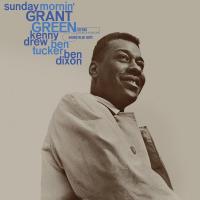Grant Green's sunday mornin'—A Blue Note That Got Away!
The Green penned opener "Freedom March" has a relaxed, bluesy swagger with Drew doing a one note thing—sometimes long remarkably fast and clean arpeggiated runs— over on the right channel complimenting Grant's similar one note at a time style. The absence of chords on fret and keyboard produces an airy, open sound aided by a remarkably spacious and clean, yet precise Van Gelder recording, particularly Drew's piano. Rarely has Rudy gotten so sparkling and open a piano sound and the air behind both Green and Dixon is notable.
The title tune is a joyous, optimistic gospel that may remind you of Steve Allen and Ray Brown's "Gravy Waltz". The side ends with Ernest Gold's theme to the movie "Exodus", which was also jazzed up around the time of this recording by Eddie Harris on the Vee-Jay album Exodus to Jazz (Vee-Jay 3016), though Green's take in keeping with the album's groove is more relaxed and swinging.
Side two opens with a cover of the familiar "God Bless and Child" (who has his own money) that the quartet takes at an appropriately slow pace allowing Billie Holiday's ironic lyrics written with Arthur Herzog, Jr. (of course not heard here, but who doesn't know them?) to deliberately roll out. Green's "Come Sunrise" follows. It's the album's most uptempo track and gives Green an opportunity to show off his clarity of line and swinging abilities. The closer is an unusual take on Miles Davis's classic "So What" that if you didn't read the title might have you thinking "where have I heard that before?" without being able to correctly identify it. Green inverts the emphasis and you may at first thing you're hearing a reprise of the ending of "Freedom March".
So how is this a Blue Note reissue that got away? It's unusual in that it's neither a Music Matters nor a Tone Poet Blue Note reissue. Rather, the license was snagged by record industry veteran Tom "Grover" Biery, who if you don't know the name might know from a series of extraordinary Warner Brothers AAA vinyl releases he instigated when he worked for the label at a time when the majors didn't really give a shit about vinyl, which was still a tiny revenue blip while CDs were still booming.
Biery asked for and got permission to issue a series of great titles from tape, cut by Bernie Grundman including James Taylor's Sweet Baby James, Van Morrison greats like Astral Weeks and His Band and the Street Choir and albums by ZZ Top along with some others. Somehow, a number of years ago, for his new label Slow Down Sounds he managed to license this outstanding Grant Green title, mastered by Kevin Gray, pressed at RTI and packaged laminated "Tip On" style by Stoughton, though here not in a gatefold edition. It took Biery some time to finally get it cut produced and released. Now it's out.
What makes this record particularly special is the sound. Firstly, Kenny Drew's piano is easily among the best sounding Van Gelder has ever recorded, which Kevin Gray surmises in one of the video interviews you can find on the label's website or perhaps on YouTube was the result of Ben Dixon's light drum touch that didn't require Rudy to physically pad down the piano with the mikes tucked inside. So the piano has a refreshingly light and open sound though with plenty of body. Drew moved to Denmark shortly after recording this set. Of course he famously played on Coltrane's " Blue Train and on Kenny Dorham's Whistle Stop.
So yes, even if you have a wall of Blue Notes, few manage to sound quite this uniformly precise and natural. Was it just a great recording day for Rudy? Or did the fact that Biery packed up the lacquers and immediately drove from the Valley to Camarillo to have them plated at RTI? No doubt the quicker the plating the better, but I'm betting most of the fabulous sound is due to a good Rudy date combined with light touch playing all around.
A great sounding (demo quality) and musically pleasurable Blue Note session that's easy to recommend. Underrated and under appreciated, Green, who passed away in 1979 at age 43, never attained Wes Montgomery's level of popularity though he should have. It's never too late!



